OCTOBER 2014
John Jay Leads the Way in $4.75M ‘Community Trust & Justice’ Project
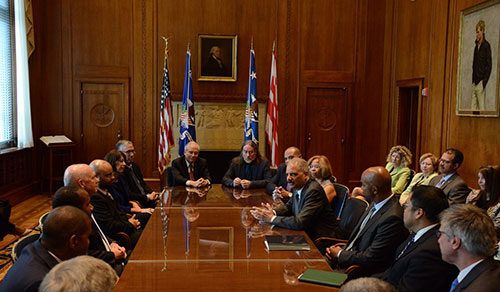
John Jay College will lead a multi-institution partnership that includes Yale Law School, UCLA and the Urban Institute in a three-year, $4.75-million project to launch a National Initiative for Building Community Trust and Justice.
The federally funded initiative, announced Sept. 18 by Attorney General Eric Holder in Washington, D.C., is designed to improve relationships between racial and ethnic minority communities and the police and other arms of the criminal justice system, and advance the scholarly understanding of, and the public conversation on those issues.
Making reference to recent racially-charged events in Ferguson, Mo., Holder said: “As law enforcement leaders, each of us has an essential obligation — and a unique opportunity — to ensure fairness, eliminate bias, and build community engagement.” The initiative, Holder said, “represents a major step forward in resolving longstanding tensions in many of America’s communities and. . .will allow us to build on the pioneering work that the Justice Department and our law enforcement partners across the country are already doing to strengthen some of our nation’s most challenged areas.”
“This is one of the most ambitious and important steps the federal government has taken during my career in criminal justice,” said John Jay President Jeremy Travis, who attended the Justice Department event along with Professor David Kennedy, Director of the Center on Crime Prevention and Control. “Addressing the broken relationships between the police and communities of color across the nation is a fundamental challenge facing our democracy. We’re honored that the U.S. Department of Justice has asked John Jay and our colleagues to do this work, and tremendously excited about what that work could mean for the country.”
The initiative will be directed by Kennedy as part of John Jay’s National Network for Safe Communities, which works in troubled communities nationally and has been a leader in developing and promoting innovative practice in racial reconciliation. Joining him will be Professors Tracey Meares and Tom Tyler of Yale Law School, Professor Phillip Atiba Goff of UCLA, and Drs. Nancy La Vigne and Jocelyn Fontaine of the Urban Institute, who will provide research and implementation support.
“This is the right team at the right time,” said Kennedy. “Our experience in city after city has shown us that both law enforcement and communities are far more ready for change than people think, Ferguson has galvanized the nation on this issue, and DoJ’s National Initiative will greatly enhance and accelerate that process.”
The National Initiative will highlight three areas that hold great promise for concrete, rapid progress:
- Racial reconciliation focuses on the historical experience many minority communities have had with the criminal justice system; how that history shapes current attitudes toward authorities and the law; how the authorities are in turn affected; and how to frankly address that experience and reset relationships.
- Procedural justice focuses on how the way police and other authorities interact with the public, and how the characteristics of those interactions shape the public’s views of the police, their willingness to obey the law, and actual crime rates.
- Implicit bias focuses on how largely unconscious psychological processes can shape authorities’ actions, and lead to deeply racially disparate outcomes even where actual racism is not present.
The National Initiative will combine existing and newly developed interventions in five pilot cities, which will be selected in the coming months; develop and implement interventions for victims of domestic violence and other crimes, youth, and the LGBQTI community; conduct research and evaluations, and develop a national clearinghouse for related information and publications.
A Hometown Hero’s Welcome for Justice Sotomayor
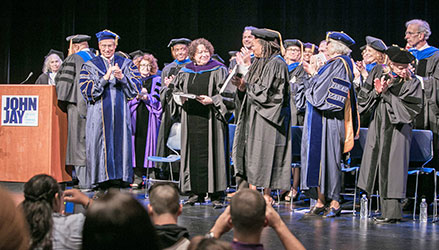
The Convocation on Sept. 17 that officially welcomed the entering Class of 2014 to John Jay included a historic visit to the College by U.S. Supreme Court Justice Sonia Sotomayor, the Bronx native who was hailed as a true hometown hero by an enthusiastic capacity crowd in the Gerald W. Lynch Theater.
“It is my honor and pleasure to officially welcome you into the John Jay family,” President Jeremy Travis said to the newest students and Justice Sotomayor. He then formally presented the Justice to the assembly and awarded her an honorary Doctor of Laws degree — only the second Supreme Court Justice to be so honored.
“I am honored to be part of your class,” Justice Sotomayor said, “the first entering class in the second half century of John Jay’s existence.” She praised the College as “a jewel in the crown of the City University system,” and its mission of “educating students in the love of justice.”
Justice Sotomayor, a Princeton- and Yale-educated former prosecutor, litigator and federal judge, went on to offer what she called a “recipe for success” in college: spend every day here creating memories; learn new things and then share them, and devote part of each day to doing something nice for someone.
“Learning how to think is a key ingredient in doing anything in the future,” she said. The Justice went on to urge students to find their passion for life in school. “Don’t specialize too early,” she said. “Take courses in as many different things as you can. Take courses just because you know nothing about that area.
“Squeeze every moment from this experience,” she concluded. “Have fun in discovery, and challenge yourself.”
The students, who were presented with special-edition Convocation pins to seal their membership in the John Jay community, signaled their appreciation of Justice Sotomayor with a lengthy standing ovation before she headed to an exclusive meet-and-greet in the Moot Court room.
Quite obviously reveling in the intimate setting with some 60 lucky students, the Justice fielded question after question, and posed for countless photos. The pre-screened questions covered a wide range of thought-provoking topics, including:
How do you stay grounded amid all of your professional accolades?
What question do you ask yourself before rendering a decision?
What accomplishment has meant the most, other than your appointment to the Court?
Why is there such a dearth of Hispanics in high-ranking government positions?
What lessons would you impart to a young person of color pursuing a career in criminal justice or public service?
Justice Sotomayor, who has been on the Supreme Court since 2009, had one more opportunity to interact with students at a reception in her honor held in the Shiva Gallery.
Law School Admissions & Scholarships Continue to Rise
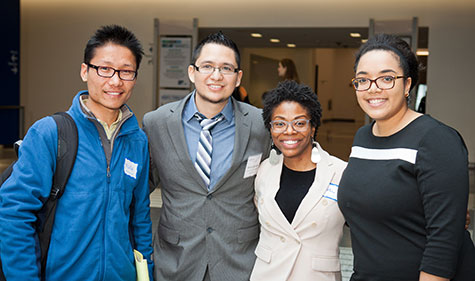
The recently concluded 2013-2014 law school application season was especially productive for John Jay students, with 41 individuals affiliated with the Pre Law Institute (PLI) securing acceptances to 65 different law schools, as well as receiving over $9.5 million in scholarship awards.
“These students were admitted to many well-regarded law schools, including several selective institutions within New York City, such as the New York University, Fordham, Cardozo Law School and Brooklyn Law School,” said Vielka Holness, the PLI Director and head of the Office of Fellowship and Scholarship Opportunities. “Many other top-ranked law schools across the country are included with not just offers of admission but also large scholarships.”
Holness credited the increase in law school admissions to students’ involvement in PLI programs such as the Pre Law Boot Camps, the LSAT Prep Program and Scholarship, and the more than 40 other opportunities offered by PLI each year.
The newest PLI initiative — the Paula Howell Anderson PLI Scholars Program — will help each of four John Jay pre-law students to prepare for law school applications. The program is funded by alumna Paula Howell Anderson, who went on to Harvard Law School and is now a partner at the law firm of Shearman & Sterling LLP, as well as a Trustee of the John Jay College Foundation.
The Anderson PLI Scholars will be chosen on the basis of their academic achievements and dedication to the pursuit of law school. The scholarship will cover costs related to registering for the LSAT, the Credential Assembly Service and the Law School Reports as well as law school application fees and participation in Pre Law Boot Camps, LSAT preparation and other PLI programs, in addition to advisement and mentoring.
The Pre Law Boot Camps are held during seasonal breaks in the academic year, giving students an intensive, week-long opportunity to polish their writing, critical thinking, argumentation and logical reasoning skills. Holness also pointed out that the PLI works to increase student success by providing increased access to individual and group advisement sessions, identifying private sponsorships, increasing the number of schools and students participating in the Graduate and Professional School Fair in conjunction with the Center for Career and Professional Development, and increasing the number of internships for pre-law students.
In addition to Anderson, the PLI enjoys the support of John Jay College Foundation trustees Anne Beane Rudman, LaBrenda Garrett-Nelson and Richard Koehler.
For more information on the PLI, including the Paula Howell Anderson PLI Scholars Program, visit www.jjay.cuny.edu/pli.
Writing Center Named for Branding Visionary Alan Siegel
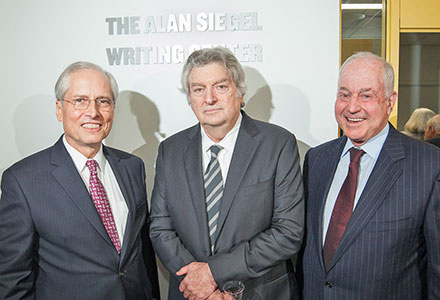
To recognize a generous gift from Alan Siegel, a Trustee of the John Jay College Foundation and President and CEO of Siegelvision, the College dedicated the Alan Siegel Writing Center on Sept. 18. The naming ceremony saluted Siegel for his commitment and contributions to building a world-class communications program for the College.
A renowned figure in branding and a pioneer behind simplified communications in business, the professions and government, Siegel developed John Jay’s brand identity keyed to the theme of “Fierce Advocates for Justice.”
“We are very grateful for Alan Siegel’s generosity as well as his contributions to the College’s new brand identity,” said President Jeremy Travis. “His dedication and vision have helped to communicate and solidify John Jay’s position as the preeminent leader in educating for justice “His support of The Siegel Fellowship will help students master their writing skills, making the dedication of our Writing Center in his name very fitting.”
The Alan Siegel Writing Center provides tutoring and writing consultation to all undergraduate and graduate students. Trained tutors work with students on conceptual and sentence-level skills, rules of grammar and style. The center emphasizes formulating a thesis, organizing and developing ideas, documenting American Psychological Association (APA) style, evaluating evidence and revising a paper, and content specific to various disciplines. The center also offers numerous writing-oriented workshops as well as intensive CUNY Proficiency Exam preparation.
The transformative gift from Siegel will also establish the Siegel Fellowship, a five-semester program led by Professor Dara Byrne that will focus on strategic internal and external communications in the private and public sectors, the development of effective presentations, clear writing techniques, and measuring the impact of one’s work. Fellows will present their creative work to a panel of experts at the end of each semester.
The Writing Center will also produce an annual Siegel symposium for all John Jay students and the public, featuring distinguished academics, communicators, corporate and government executives and researchers to explore strategic communications issues and connecting with key academics.
Over five decades, Siegel has been both a pillar of the establishment and provocative iconoclast while building Siegel+Gale, one of the leading global brand consultancies. In 2011, he created Siegelvision, a new company focused on solving tough branding and communications problems for purpose-driven organizations. Siegel has written extensively on branding and the importance of simplicity as a competitive advantage. His latest book, Simple, co-written with longtime colleague Irene Etzkorn, was named a “Best in Business Book of 2013” by Booz & Company.
Sex Work Is the Focus of Semester-Long Series
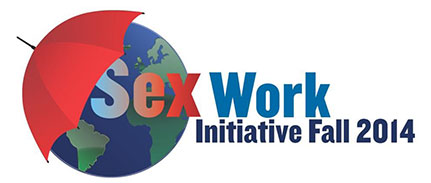
Professor Samantha Majic’s scholarly interest in sex work and the rights of those in the trade dates to her doctoral studies at Cornell, when she focused on poor women’s sexuality in the context of gender and political issues. Now, on the heels of her latest book, Sex Work Politics: From Protest to Service Provision, Majic is the opening presenter in the “Sex Work Initiative,” a series of panel discussions, lectures and book talks that will run throughout the fall semester.
Having shifted the focus to the policy side of sex work while doing field research in San Francisco, Majic, a member of the Department of Political Science, pointed out that sex work is more than just prostitution. It also includes dancing, pornography and fetish work, among other forms, yet only prostitution is criminalized. Moreover, she noted, the United States is the only Western country that almost uniformly criminalizes prostitution.
Some factions, Majic noted, “have linked up to fight sex work from a consumer standpoint, the johns, but what they’re doing is just reapplying criminalization.”
Majic also sees a propensity for mislabeling. “There’s a tendency to equate all sex work with sex trafficking, but they’re not the same thing.” She is hopeful that the Sex Work Initiative will encourage others to think about the subject more broadly, and get away from the common misconception that sex work and sex trafficking are synonymous.
In Sex Work Politics, Majic examines two nonprofit organizations in San Francisco — the St. James Infirmary and the California Prostitutes Education Project — that provide free, nonjudgmental health and social services by and for sex workers. To maintain these services and to qualify for government funding, such organizations must comply with federal and state regulations for nonprofits, and Majic explores how nonprofit organizations negotiate their governmental obligations while maintaining a commitment to outreach, advocacy and sociopolitical change.
Majic discussed her new book, which was published by the University of Pennsylvania Press in December 2013, in a book talk held on Oct. 8 in the Moot Court. Other events in the semester-long series include panel discussions on system responses to the sex trade (Oct. 22), sex worker narratives in their own words (Oct. 29) and sex worker health and safety (Nov. 5), and an open-forum faculty conversation on funding sex work-related research (Nov. 12). For the complete Sex Work Initiative schedule, contact Bettina Muenster at bmuenster@jjay.cuny.edu.
A Summer to Remember for 19 John Jay Sophomores
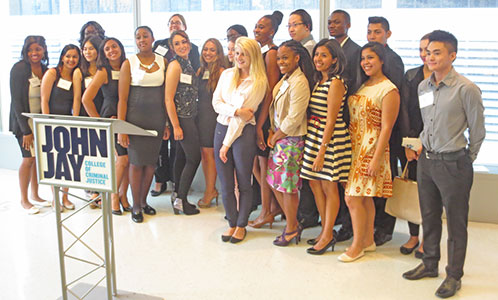
Thanks to a $95,000 grant from the Jewish Foundation for Education of Women (JFEW), 19 John Jay sophomores enjoyed singular internship experiences over the summer with city and state agencies, nonprofit organizations and law offices.
The interns — 15 women (JFEW Scholars) and four men (John Jay Scholars) — and their agency mentors were saluted at a closing ceremony in late summer, at which President Jeremy Travis thanked JFEW board members for providing “opportunities for ambitious, motivated young people.”
“It’s very satisfying to watch young people such as these come through our doors to learn and grow,” the President said.
Facilitated by the College’s Center for Career and Professional Development, the JFEW-John Jay Summer Scholars Program combines hands-on internships with academic coursework and professional development workshops. The interns are provided with financial support in the form of tuition scholarships and internship stipends, as well as crucial mentoring from agency professionals.
“I learned so much and met so many inspirational and intelligent people along the way,” said Justine Rayborn, an Honors Program student and Forensic Psychology major from Queens, who interned with the New York State Court Navigator Program, providing non-legal assistance to civil court litigants. “I learned a lot about communication and dealing with people, and found ways to relate it to my major.”
Naomi Haber, a CUNY BA and Honors Program student from Monsey, N.Y., parlayed her interests in social justice and public relations/communications into dual internships with MET Council, where she served as media coordinator for an anti-human trafficking task force, and Rouge NY, New York City’s first “beauty bar,” where she worked in digital marketing. “I wanted to see if I could apply for-profit marketing and business strategies to nonprofits that need help expanding,” she said.
Participants in the 2014 JFEW John Jay Scholars Program, and their internship hosts, were:
New York State Office of the Attorney General: Rachel Abdan, Tetyana Martsiyash, Bayron Flores.
NYS Court Navigator Program: Sophia Brinnius, Suzana Djencic, Justine Rayborn, Jia Qi Zhang.
New York City Department of Correction (and NYS Court Navigator): Jessica Jean
John Jay Office of Marketing & Development (and NYS Court Navigator): Ming Ho (Erykh) Wong.
NYS Office of the Inspector General: Andrene Wright.
NYC Department of Transportation: Talisha Hamilton.
NYC Department of Investigation: Desmond Li.
Equal Employment Opportunity Commission: Shiny Sharma.
Center for Lesbian and Gay Studies: Liner Nuñez.
Tremr: Donauta Watson Starvecic.
MET Council & Rouge NYC: Naomi Haber.
Office of U.S. Representative Joseph Crowley: Zag Kimpolo.
Law Office of Michael Goldberg: Estefani Llanos.
Law Office of Brian Thomas: Elizabeth Sanchez.
Remembering 9/11 with Pledges of Action
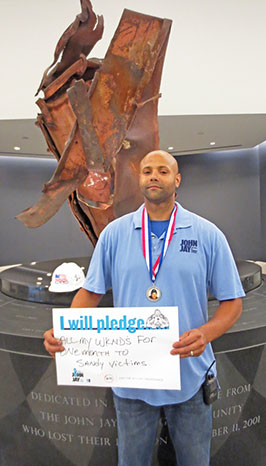
Jonathan Romano was one of many members of the John Jay community who marked the 13th anniversary of the Sept. 11 terrorist attacks by making pledges of action and community service. Romano, a carpenter with the Department of Facilities Management, stands in front of the College’s 9/11 memorial with his pledge to give “all my wknds for one month to Sandy victims.”
And Justice for All. . .
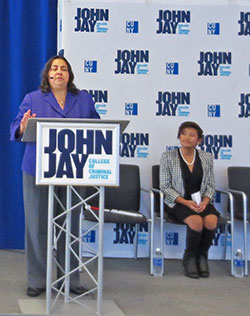
Kathy Martinez, Assistant U.S. Secretary of Labor for Disability Employment Policy, was the keynote speaker at the conference “Pursuing Justice” that was held at John Jay on Sept. 19 to mark the 15th anniversary of the watershed Supreme Court decision in Olmstead v. L.C., which affirmed the rights of people with disabilities to live, work and fully participate in their communities. Martinez pressed the cause of “integrated employment,” which she called a “gateway to economic and social independence. “It’s time to take off the chains of low expectations,” said Martinez. The speaker was introduced by John Jay Student Council Secretary Grace Agalos, who observed that Martinez, who was born blind, “reminds us that just because we have a disability doesn’t mean we are below anyone else.” Martinez’s presentation at the conference was noted in the Labor Department’s online newsletter DOL News Brief. Click here to read more.
Faculty/Staff Notes
Presenting. . .
Candace McCoy (Criminal Justice Ph.D. Program) was a guest on the PBS special "America After Ferguson" that aired on Sept. 26. The special, which looked at issues raised by the shooting death last month of Michael Brown in Ferguson, Mo., also featured former president Bill Clinton, NPR host Michele Norris and actress-playwright Anna Deavere Smith. Click here to watch the program.
Natalie Sokoloff (Sociology, emerita) was a featured analyst on the Sept. 9 edition of the MSNBC program “The Last Word with Lawrence O’Donnell,” in which she discussed issues pertaining to the domestic violence case involving football player Ray Rice and his then-fiancée. Sokoloff is co-editor of the 2005 anthology Domestic Violence At the Margins. Click here to view the entire MSNBC report.
Peter Moskos (Law, Police Science and Criminal Justice Administration) was featured as “Greek of the Week” on New Greek TV, where he discussed his book, Greek Americans: Struggle and Success (3rd ed.). The book, the first two editions of which were written by his father, sociologist Charles Moskos, examines the history, strengths, conflicts and contributions of Greek Americans. To read the accompanying article, click here.
Jeremy Travis (President) was interviewed on National Public Radio Sept. 12 as part of a retrospective on the 1994 Violent Crime Control Act. President Travis discussed the law’s impact of the burgeoning U.S. prison population. Click here to listen to the report and read the accompanying article. President Jeremy Travis was a featured interviewee on WNYC’s “Brian Lehrer Show” on Sept. 24, addressing the aftermath of the controversial police shooting of a black teenager in Ferguson, Mo., and the new federally funded initiative led by the College to improve relationships between police departments and minority communities. President Travis was also interviewed on the subject by St. Louis Public Radio for the article “Justice Department Launches Effort to Establish Trust Between Police, Communities,” which appeared online on Sept. 23. Click here to listen to the WNYC interview. Click here to read the online article.
Carla Barrett (Sociology) appeared on NY1’s “Inside City Hall” program to discuss the treatment of teenage inmates on Riker’s Island and ways to improve the current state of juvenile justice. Barrett pointed out that Riker’s Island is not a facility that was designed to detain juveniles and doesn’t have staff trained to deal with this population. To watch the NY1 segment, click here.
The Printed Page
Barry Spunt (Sociology) recently published his new book, Heroin and Music in New York City, (Palgrave Macmillan). The book includes narrative accounts from 69 New York-based musicians to paint a portrait of what one reviewer described as “a vast human tragedy.”
John Matteson (English) published an op-ed on Time.com, “Slavery Matters More than Ever,” in which he asserts that, 150 years after the Civil War, the “fire bells” of racial violence and inequality still ring in the United States. Matteson maintains that hardened attitudes on race contributed to situations like the recent killings of black teenagers Trayvon Martin and Michael Brown. Click here to read the Sept. 19 commentary.
Grantsmanship
Elise Champeil (Sciences) has been awarded a $463,861 grant from the National Institutes of Health to continue her research into the functioning of cancer cells and antitumor agents. The four-year project — “Role of p21 Signaling Pathway in Response to MC & DMC DNA Interstrand Crosslinks” — builds on earlier research she has conducted into the functioning and efficacy of chemotherapeutic agents mitomycinC (MC) and 10-decarbamoyl mitomycin C (DMC).
Recognition
Rosemary Barberet’s (Sociology) new book, Women, Crime and Criminal Justice: A Global Enquiry, has been named the winner of two academic honors. The book, published in April by Routledge, will receive the 2014 Distinguished Book Award from the American Society Criminology’s Division of International Criminology, and the 2015 Outstanding Book Award of the International Section of the Academy of Criminal Justice Sciences. Barberet was also recently selected as the new editor for the ASC Division of Women and Crime’s journal, Feminist Criminology.
